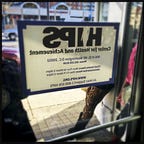Sex Workers Need Housing, Not Handcuffs
For many communities across Washington, DC, barriers to securing safe and affordable housing can be particularly steep. For those engaged in survival sex work, housing access can seem like an insurmountable task.
According to a community needs assessment conducted by HIPS in 2018, 79% of sex workers surveyed reported that housing was their most immediate need. In a 2015 survey, 37% of trans sex workers in DC reported that they were currently experiencing homeless. Nearly half of those engaged in sex work have been experienced homelessness at some point in their lives.
Nationally, nearly one in five trans people have done sex work in their life, and the number increases to two in five for Black trans women. Many turn to sex work to survive after experiencing discrimination or abuse and being denied access to education, employment, housing, family support and healthcare. Data shows that the unemployment rate for Black Trans people in Washington, DC is 55%, and a report by DC’s Office on Human Rights found that 48% of DC employers preferred a less qualified cisgender applicant over a more qualified transgender applicant.
For many of those engaged in survival sex work in the District of Columbia, discrimination and harassment is experienced through multiple identities with historical and contemporary disparate access to resources. Many sex workers in Washington, DC are Black or Brown. They are members of the LGBTQ community, and more specifically, many are trans or gender nonconforming people. And, due to the discrimination that they face when seeking education, employment, housing, and other necessities, they are often surviving poverty.
With a lack of stable housing, lack of employment opportunities and with fewer online venues to turn to, sex workers have few alternatives to street-based sex work. However, due to criminalization and discrimination, street-based sex work comes with the threat of harassment, arrest, and violence. A past HIPS survey showed that 90% of respondents had experienced any violence. A survey in New York showed over 80% of street-based sex workers reported experiencing violence in the course of their work.
Further, sex workers often feel unable to seek help from police due to negative past interactions with police and fear of criminalization. Three-quarters of D.C. sex workers were dissatisfied with police response to requests for help and reported that they often made the situation worse through abusive and discriminatory treatment. And in DC, one in five sex workers (or individuals profiled as sex workers) have been approached by police asking them for sex.
Cycles of violence, discrimination and criminalization create obstacles to stable housing, employment and healthcare. Appropriately meeting the current need for long term housing solutions is essential for the health and safety of sex workers in the District.
Stable housing does more than protect sex workers from negative treatment, violence, and harassment. Supportive housing provides security and safety for sex workers. Sex workers participating in a housing first pilot program in the UK reported: improvement in physical and mental health; better connection to services, including medication assisted treatment for drug use; and implementation of harm reduction practices in their work. This housing first pilot also demonstrated cost savings in terms of reduced need for services over time and reduced use of emergency services and healthcare. Housing, combined with access to healthcare, and culturally competent supportive services is a public health and economic necessity. Here in DC, due to the scarcity of housing options for many current and former sex workers, community organizers like those at the No Justice No Pride Collective provide community supported “long-term and temporary housing for Black and Brown Trans women and current and former sex workers.”
Housing should be a right for all Washingtonians. Rightsizing the District’s current dearth of housing options, including permanent supportive housing (PSH) and targeted affordable housing (TAH), creates more safety and well-being for everyone — especially those already marginalized due to their work, gender identity, LGBTQ+ identification, race and/or overcriminalization.
Fully funding The Way Home Campaign’s housing ask — to invest $35.5 million to house 1,140 individuals and 177 families in FY2020 — is a positive step toward addressing the dire need of DC residents, including sex workers.
* * * * * * * * *
The Sex Worker Advocates Coalition (SWAC) is a group of nearly 20 organizations and individuals promoting the human rights, civil rights and liberties, health, safety, and well-being of sex workers and people profiled as sex workers and advocating for legislation and other policy changes to challenge the system of criminalization of sex work in Washington DC.
